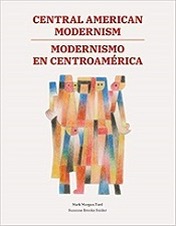Bits and Pieces
Nice!

Here’s the most recent review of our book, Central American Modernism. It’s from Dr. David Greene, retired head of the art department at North Carolina State University:
The publication of this book has huge implications for the place of Central American art on the world stage. It… makes the case that this art is not just a miscellany of interesting artists, but is a place, a movement, a style – like Paris between the wars, like New York in the 1950s.
I didn’t know this:
We were emailing about writing. He said: “Did you know that there’s a ridge at the bottom of the F key and the J key on the keyboard to help you set up your fingers in the right position to type without looking?”
I was doubtful. I looked down. Sure enough, there they were.
“Cripes,” I replied. “I’ve spent 40-plus years hitting keyboards. How did I not ever notice that?”
I did some research. According to Deskthority, “most keyboards carry tactile indicators to help your fingers find the home position. On most keyboards, there is a raised ‘homing bar’ near the bottom edge on the F and J keys.”
That is true of my MacBook Air. But instead of bars, some keyboards have “homing dots.” (In some vintage Macintoshes, for example, those dots are on the D and K keys.) There are also keyboards with “dished” homing keys, which are deeper in the middle.
This has happened to me at least a dozen times in the last 10 or 15 years. By “this,” I mean I learned something I wish I had learned when I was much younger.
The very next day after this “homing key” discovery, I learned how to fill in those annoying holes you occasionally find when you open up a newly purchased Christmas tree. (The solution is as brilliant as it is easy.)
I’m going to write a post about such lessons learned late in life. If you have some of your own, please send them to me.
From the FTC: How to Protect Yourself From Telephone Scammers
You get a call from someone claiming to be from a government agency like the Social Security Administration or the IRS. They say that you owe them money, and scare you into thinking something bad will happen to you if you don’t pay up immediately.
It’s a scam! Don’t fall for it!
* Never wire money, send cash, or use gift cards or cryptocurrency to pay someone who says they’re with the government. Scammers want you to pay in those ways because it’s hard to track and almost impossible to get the money back.
* Never give your financial or other personal information to anyone who says they’re with the government. If you think there’s a chance that the problem they say they’re calling about is legitimate, deal with it by contacting the agency directly.
* Don’t trust your caller ID. Your caller ID might show a government agency’s name, but that can be faked. The call could be from anyone, anywhere in the world.
* Never click on links in emails or texts from anyone you don’t know. Simply delete the message.
“I ought to back hand you right in the teeth!”
Many parents are justifiably worried about what their children are being taught in school. Intersectionality, gender fluidity, and critical race theory, these parents argue, are not appropriate subjects for minor children.
Ideological indoctrination (especially lunatic ideas like the above) is a serious threat and deserves the pushback its getting from concerned parents. But there are other threats that those parents should be aware of, such as what this mom discovered…
Click here.
The Wormhole – from Shakespeare to Astrophysics

If you associate “wormhole” with quantum physics and sci-fi, you’ll probably be surprised to learn that the word has been around since Shakespeare’s day.
To astrophysicists, a wormhole is a theoretical tunnel between two black holes or other points in space-time, providing a shortcut between its end points. To Shakespeare, it was simply a hole made by a worm.
Of course, the bard did not restrict his use of the word to the literal. Here’s how he tied it to the passage of time in his poem “The Rape of Lucrece”:
Time’s glory is to calm contending kings,
To unmask falsehood and bring truth to light,
To stamp the seal of time in aged things,
To wake the morn and sentinel the night,
To wrong the wronger till he render right,
To ruinate proud buildings with thy hours
And smear with dust their glitt’ring golden towers,
To fill with worm-holes stately monuments,
To feed oblivion with decay of things,
To blot old books and alter their contents,
To pluck the quills from ancient ravens’ wings,
To dry the old oak’s sap and cherish springs,
To spoil antiquities of hammered steel
And turn the giddy round of Fortune’s wheel…
YouTubing…
Janet Yellen is scary!
Maliya Kabs, my favorite YouTube celebrity…Here
Bugs Bunny’s got game…
Worth Quoting

You know who Judy Garland was. Superstar. Award-winning actress. Singer extraordinaire. Gay icon. But did you know that she was also an amateur poet?
In 1939, she published a collection of her poems. This is a couplet from one of them:
For ‘twas not into my ear you whispered but into my heart.
‘Twas not my lips you kissed, but my soul.
I thought that was pretty good. Not just the construction, but the thought. So I went to Dr. Mardy’s website to find some other good quotes about kissing:
* “Never let a fool kiss you or a kiss fool you.” – Joey Adams
* “Lips that taste of tears, they say, are the best for kissing.” – Dorothy Parker
* “The kiss originated when the first male reptile licked the first female reptile,
implying in a subtle, complimentary way that she was as succulent as the small reptile he had for dinner the night before.” – F. Scott Fitzgerald
3 Words I’m Trying to Work Into My Conversations
* Habiliment (huh-BIL-uh-munt) – from an Old French word for “clothing” (“habillement”) – refers to the dress or equipment characteristic of a profession. A full set of armor, for example, can be considered the habiliment of a knight.
* A tarradiddle is a trivial or childish lie. Its origin is uncertain, but some etymologists think it was derived from “diddle” (an English word for “to cheat or swindle”). If you’re a Harry Potter fan, you may remember Cornelius Fudge dismissing the possibility that Voldemort was still alive by saying to Dumbledore, “We haven’t got time to listen to more tarradiddles.”
* Nepenthe (nuh-PEN-thee) is a fictional drug mentioned in Greek mythology – a cure for sorrow. It is used to refer to a pleasurable feeling of forgetfulness, especially the relief of pain. Example from The Raven by Edgar Allan Poe: “Quaff, oh quaff this kind nepenthe and forget this lost Lenore!” / Quoth the Raven “Nevermore.”
Readers Write…
Re what I said in the Nov. 11 “Bits and Pieces” issue about enhancing my image on Zoom calls:
“Where you see an uncomplimentary glimpse of yourself on Zoom, your reaction is based on a conviction of your handsomeness and a failure on the technology and thus you find the solution of spending thousands of dollars in technology to solve this unjust version of you, my natural reaction is further conviction of my less than excellent looks and a thought to consider some thousands of dollars in plastic surgery. Hilarious difference and probably why you are 10,000 times more successful than me.” – CF
Re the story of My African Wedding:
“From reading your books on business and wealth building, I had an image of you that did not jibe with that story you told about your African wedding. You should show more of that self in your blog posts.” – LP
“What a beautiful story. Thanks for sharing!” – HL
“I was intrigued. What an adventure!” – PG
Re my sarcastic essay on shoplifting in California in the Dec. 5 “Bits & Pieces” issue:
“You Dog! This is why I can never trust you. I am reading this, and 2or 3 sentences in when you started sounding like a SJW and a 2nd year undergrad student from Berkeley had me wondering if you were being real. But when your performance art piece went off the rails and started using ALL the pushbutton phrases without any modesty and culminated in wondering about Biden’s Justice Dept. ignoring the fascist CEO of Best Buy, I knew you were F-ing with your audience!” – FC
